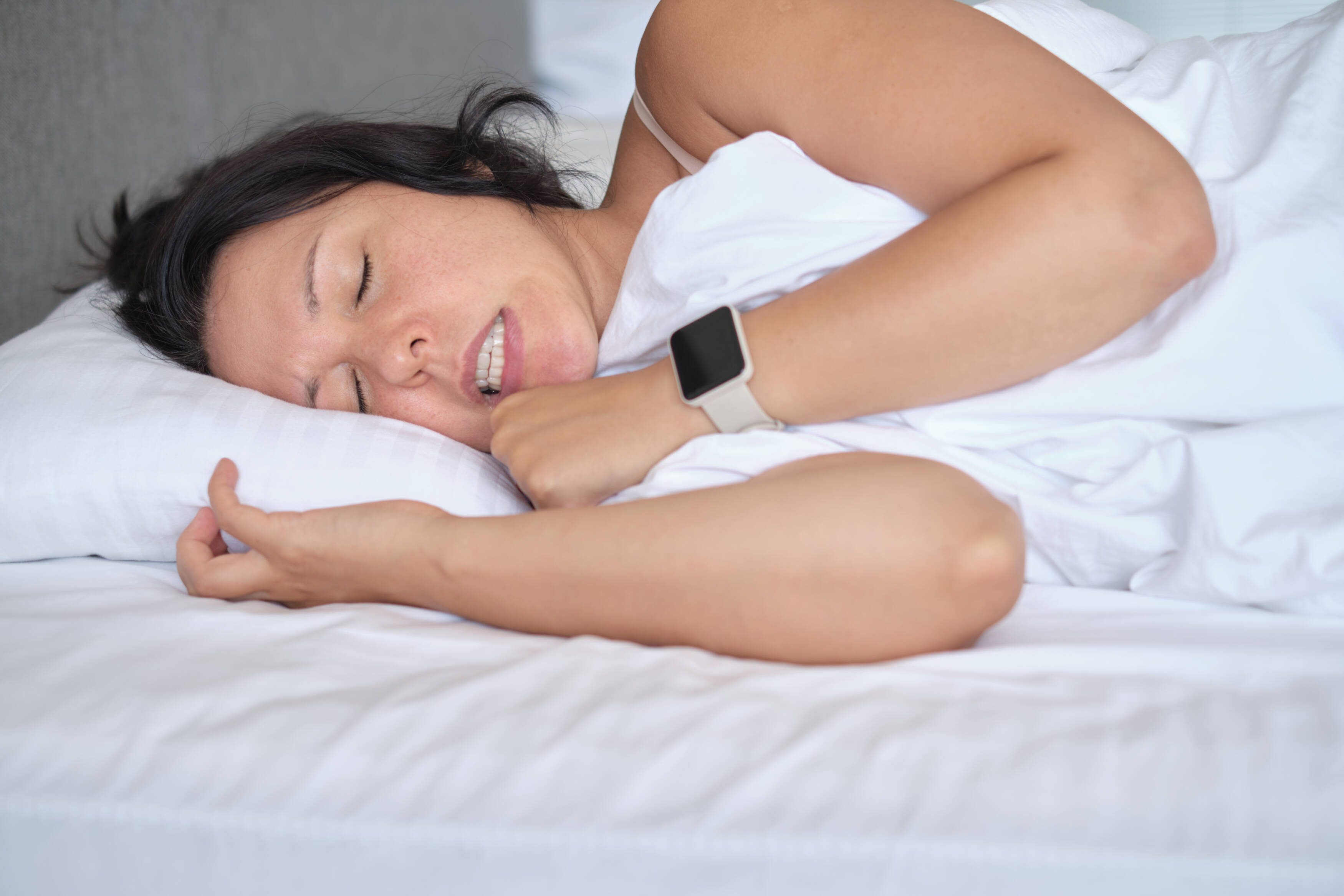
How Do I Know If I Grind My Teeth?
Whether it’s stress, anxiety, or an abnormal bite, the effects of tooth grinding, also called bruxism, can be devastating to both your health and your general well-being. Grinding your teeth at night often leads to sleeplessness, jaw pain, and a whole host of other issues that you may or may not be aware of.
Common Questions About Tooth Grinding
Because tooth grinding is frequently related to the amount of stress present in your life at any given time, life changes such as divorce, changing jobs, a poor work/life balance, or a death in the family can trigger teeth grinding without you ever realizing that you are taking the stress out in a very physical way.
So, you may ask yourself, “How do I know if I grind my teeth?” Let’s explore that question and other related questions in order for you to better self-diagnose the problem and seek teeth grinding treatment from the appropriate healthcare professional.
How Do I Know If I Grind My Teeth?
The first indication that you grind your teeth may come from your sleep partner or someone who lives in the same home as you. While you may not be aware that you’re grinding, the noise from sleep bruxism may be loud enough to wake up the other person.
Other symptoms of bruxism could include:
- waking up with tired or sore jaw muscles;
- pain in the jaw joints;
- pain radiating to the neck, face, or ear;
- pain when chewing gum or eating;
- other sleep related movement disorder;
- unexplained headaches in the temples; anxiety or tension before bedtime;
- and sleep disruption that prevents you from feeling recharged by restful sleep.
See your dentist if you are experiencing any of these symptoms or have other concerns about your teeth or jaws.
How Do You Test For Grinding Teeth?
When individuals begin a teeth grinding habit, they often have very mild symptoms or no symptoms at all. In fact, many people only learn they grind their teeth when their dentist or someone else notices the signs.
Unfortunately, there are no diagnostic tests for bruxism, per se. Bruxism is diagnosed by the collection of signs and symptoms that present while ruling out other causes. However, there are risk factors that make certain people more prone to grinding their upper and lower teeth. These include:
- Anxiety
- Stress
- Lifestyle habits, including nicotine use, drinking alcohol, and caffeine consumption
- Taking certain types of medications, such as selective serotonin reuptake inhibitors (SSRIs)
- Sleep apnea or other sleep disorders
What Do Teeth Look Like If You Grind Them?
Bruxism patients can do a lot of damage to their teeth and any previous dental work, such as cosmetic veneers and fillings. Visible signs of tooth damage include flattened, fractured, or chipped teeth and broken teeth restorations. Other signs include popping of the temporomandibular joint. Certain teeth may also be loose from the trauma caused by grinding. Grinding can progress to the point where the layers of the teeth beneath the tooth enamel are exposed to air and acids in the oral environment, causing tooth sensitivity and tooth pain. The patient may also experience facial pain.
If the grinding habit is allowed to progress for a significant period of time, the patient can actually lose vertical dimension, making the lips disappear while in a rest position, which mimics the appearance of patients who wear dentures that don’t fully support their face. In other words, it may seem like your teeth have become too short to support your lips or your teeth no longer show when you smile.
How to Stop Grinding Teeth
Without addressing the root cause of grinding, your teeth can become worn down (a process known as attrition) or highly sensitive, which may require extensive dental work to repair the damage. Bruxism is really a multifactorial problem that involves the nexus of several disciplines including dentistry, mental health, nutrition, and even the pharmaceuticals that are being used to treat chronic health problems.
Proper Dental Care
The first step to any tooth grinding issue is to receive an evaluation from your dentist, preferably sooner rather than later, and be fitted with a night guard. No matter the source of the grinding issue, a night guard will protect your teeth from becoming further damaged while you explore the cause of grinding.
If the cause of tooth grinding is related to a bad bite or other dental issues, your dentist may recommend orthodontic treatment or restorative work with crowns that can alter the shape of your teeth and improve your bite. Some dental treatment options are simple or temporary, while others require a greater outlay of time and financial resources.
Talk your options over with your dentist. Seek a second opinion if you’re not completely comfortable with the treatment options that have been presented. There are frequently multiple valid treatment methods for addressing almost any dentally-related concern.
Mouth Guard
A mouth guard covers and fits over the chewing surfaces of the teeth when you are most likely to subconsciously grind your teeth. That way, the teeth are protected, and any damage from grinding is done to the protective guard rather than your own teeth.
Although generic mouth guards are available at drug stores and supercenters, a custom-fitted mouth guard or night guard ensures a snug fit without falling out or rubbing the gums during sleep. These trays are generally 2-3 mm in thickness and are somewhat soft but durable. This allows a cushion on the biting surface, thus eliminating tooth-on-tooth grinding and reducing jaw and tooth soreness due to clenching.
Although mouth guards are typically worn at night, it is possible to wear the guard during waking hours or while working if you are the type of person who is frequently tense and carries tension in your jaws. Typically, people with sleep related disorders will also wear mouth guards.
Stress Reduction
Many people have trouble with jaw clenching or grinding teeth while sleeping at some point in their lives. As your situation changes, the issue may be resolved on its own. It doesn’t necessarily mean that it is something that you are stuck with from now on. In the meantime, consider some stress reduction techniques that can help anyone to reduce anxiety and decompress.
One method to reduce stress is to get regular exercise. Go running or walking a few times a week. Swimming is both relaxing and easy on the joints. Practices that promote calmness, unplugging from the outside world, and relaxation, such as facial or targeted massage, acupuncture, and daily meditation, work well to relieve symptoms of bruxism and TMJ disorders. Stress counseling and mental health therapy can also be helpful in the quest to prioritize and take care of yourself before becoming wrapped up in the issues of others.
Proper Oral Health with European Denture Center
Why waste your money with drugstore mouth guards that often end up falling out of your mouth in the middle of the night? European Denture Center makes custom-fitted mouth guards from high-quality materials that fit snugly but comfortably, ensuring protection for your teeth while you sleep.
Our caring denturists and dentists will work with you to get to the bottom of your tooth grinding problem, offering advice, dental services, and referrals as appropriate. Do you really want to suffer another sleepless night? The next step to address your bruxism issue is only an evaluation away.
Contact us to arrange your free consult appointment!


